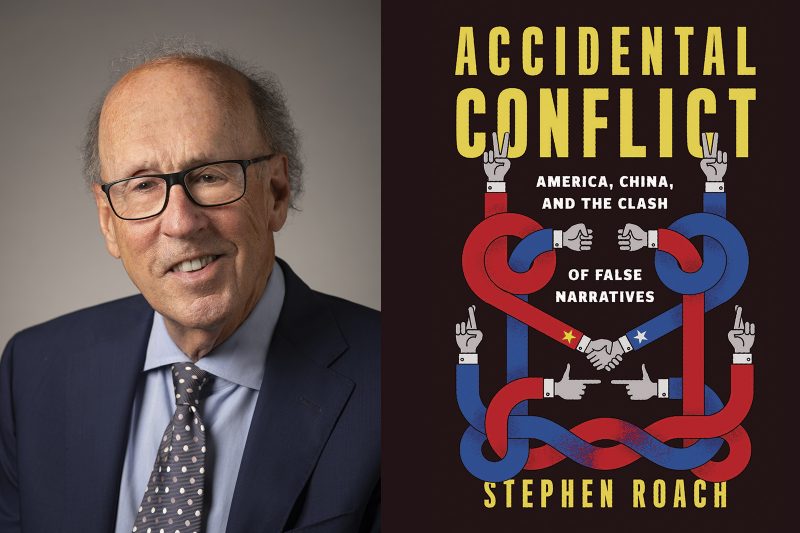Stephen Roach’s forthcoming new book offers both a cautionary tale and an optimistic approach to U.S.-China relations.
When you think about codependency, romantic relationships usually come to mind, not international partnerships. But economist Stephen Roach believes it’s a particularly apt framework to examine the U.S.-China relationship.
“We have become so dependent on China, and China has become so dependent on us, that we’ve lost sight of some of our core foundations of economic strength. When you’re as vulnerable to weak economic foundations as we in America actually are, and as China actually is, then rather than face up to those vulnerabilities, you’d rather blame them on your partner,” Roach explained.
China is the United States’ largest trading partners, with $715.9 billion in goods and services traded between the two countries in 2021. Roach argues that the economic dependency, as well as a web of false narratives occurring between the two countries, has led to an “accidental conflict”. Some aspects of this conflict may even signal the beginnings of a new U.S.-China Cold War, Roach believes. The topic is at the heart of his forthcoming new book, Accidental Conflict: America, China, and the Clash of False Narratives, due out this fall.
Roach came to Jackson as a Senior Fellow in 2010, after a 30-year tenure at Morgan-Stanley, where he was chief economist and chair of the firm’s Asia businesses. He is one of the leading experts on the United States’ relationships with Asian countries, including Japan and China.
Roach believes that a series of false narratives on both sides are fueling the U.S.-China conflict. For example, the U.S. blamed China for the U.S. trade deficit and levied tariffs against Chinese goods in retaliation. But Roach points to the U.S. trade deficit with more than 100 other countries to suggest that the deficit with China is not solely to blame.
“When we squeeze a country like China, it’s like whack-a-mole, the deficits pop up elsewhere,” he explained. Reducing the trade deficit with China only led to larger trade deficits with other countries.
For Roach, a more sustainable solution is to address the root cause of the trade deficit—America’s lack of domestic savings. The U.S., at both a government and individual level, suffers from inadequate saving. The result is that the U.S. must borrow surplus savings from overseas to continue to invest and grow its economy.
Since China has huge savings surpluses, it lends that surplus to the U.S. This only serves to increase the co-dependency between the two nations. Balancing out both economies would lead to more sustainable growth prospects for both countries, Roach argues.
Another example covered in the book is the threat the United States perceives from Huawei, the Chinese telecommunications giant and a major supplier of the innovative 5G technology. Since Huawei is a Chinese company—and therefore under the influence of the Chinese Communist Party—there are fears that China could use the company to spy on the U.S.
Roach believes that these fears are unfounded. “By vilifying an alleged foreign enemy [Huawei], without any evidence to validate that, it blocks us from considering the more serious possibility that we have underinvested in the very technologies that we think are so important,” Roach says.
These false narratives intensified during the COVID-19 pandemic, when supply chain issues abounded and China was accused of causing the pandemic through a laboratory leak in Wuhan. Roach believes these narratives offered a scapegoat for the U.S. government, allowing it to avoid blame for the nearly one million COVID-19 related deaths caused in part by mismanagement of the pandemic.
On the China side, Roach points to the extreme censorship strategy of the Chinese Communist Party as generating a quagmire of false narratives. China “is afraid of the true narratives, and that tells you something about the character of China,” Roach said.
Roach proposed several solutions to improve the U.S.-China relationship. One is to work together on areas of common interest, including climate change, global health, and cyber security. While he doesn’t think this will solve the issue completely, it’s a first step to rebuilding trust.
Roach also believes that the U.S. and China should resume negotiations on an almost-completed bilateral investment treaty that will promote opportunities through which each country can invest in the markets of the other.
Finally, Roach suggests the establishment of a permanent secretariat to manage the US-China relationship on a full-time basis, which may help to establish better dialogue between the two countries.
Roach hopes to motivate policymakers from both countries to discuss solutions for resolving the accidental conflict “before it’s too late.”
The book is a result of exhaustive research, some of which was conducted with the help of Jackson students. Roach has taught a Yale class on U.S.-China relations (‘The Next China’) for 13 years. Over the last few years, Roach used the course to lead student discussions on several of the themes he discusses in the book. He appreciates the freedom that the Jackson Institute provides to design courses to match his expertise and to explore new ground.
“There is a real commitment to understanding global issues that Jackson has been on the forefront in fostering debate and exchange. The students have been enthusiastic participants in this process,” Roach said.
Perhaps this new batch of young scholars, educated by Roach, will approach the U.S.-China relationship differently than their predecessors. As we all know, relationships are difficult, and sometimes recurring conflicts need to be addressed in new ways. Stephen Roach’s forthcoming book offers us a road map.
Accidental Conflict: America, China, and the Clash of False Narratives will be published in autumn 2022 by Yale University Press.
